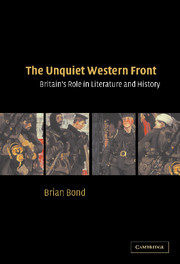Book contents
- Frontmatter
- Contents
- PREFACE AND ACKNOWLEDGEMENTS
- 1 THE NECESSARY WAR, 1914–1918
- 2 GOODBYE TO ALL THAT, 1919–1933
- 3 DONKEYS AND FLANDERS MUD THE WAR REDISCOVERED IN THE 1960S
- 4 THINKING THE UNTHINKABLE THE FIRST WORLD WAR AS HISTORY
- SIR LEES KNOWLES (1857–1928)
- THE LEES KNOWLES LECTURES
- NOTES
- SELECT BIBLIOGRAPHY
- INDEX
2 - GOODBYE TO ALL THAT, 1919–1933
Published online by Cambridge University Press: 20 July 2009
- Frontmatter
- Contents
- PREFACE AND ACKNOWLEDGEMENTS
- 1 THE NECESSARY WAR, 1914–1918
- 2 GOODBYE TO ALL THAT, 1919–1933
- 3 DONKEYS AND FLANDERS MUD THE WAR REDISCOVERED IN THE 1960S
- 4 THINKING THE UNTHINKABLE THE FIRST WORLD WAR AS HISTORY
- SIR LEES KNOWLES (1857–1928)
- THE LEES KNOWLES LECTURES
- NOTES
- SELECT BIBLIOGRAPHY
- INDEX
Summary
Thirty years ago Correlli Barnett published a fierce critique of British ‘anti-war’ literature in the 1920s from a historian's viewpoint. Although his overall thesis, namely that the anti-war literature seriously undermined the public's readiness to resist Nazism in the 1930s, differs from mine, nevertheless his indictment still provides a firm basis for my own account.
Barnett pointed out that most of the best-known memoirs and novels were written by ex-public school temporary officers who were much more sensitive and imaginative than the vast majority of their comrades. They reacted excessively to the privations and miseries inseparable from all wars which the hardier, tougher other ranks endured phlegmatically; indeed he suggested that in some respects they, the ordinary soldiers, were better off than in ‘civvy street’. Like earlier critics such as Cyril Falls, Barnett accused the ‘anti-war’ writers of focusing obsessively on ‘the horrors’ of combat thereby distorting the complex reality of military experience and, incidentally, masking the fact that they were killers as well as victims. Most important of all, because these writers were concerned with conveying personal experiences as vividly as possible, and anyway had a limited perspective, they largely evaded the crucial issues of what the war was ‘about’ – both on the political and strategic levels. This huge omission was understandable, since they were still close to disturbing events, and did not claim to be historians, but later commentators too often ignored these limitations.
- Type
- Chapter
- Information
- The Unquiet Western FrontBritain's Role in Literature and History, pp. 27 - 50Publisher: Cambridge University PressPrint publication year: 2002



